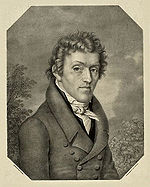Georg Friedrich Creuzer, Date of Birth, Place of Birth, Date of Death
TweetGeorg Friedrich Creuzer
Philologist and archaeologistAbout Georg Friedrich Creuzer
- Georg Friedrich Creuzer (German: ['k???ts?]; 10 March 1771 – 6 February 1858) was a German philologist and archaeologist. He was born at Marburg, the son of a bookbinder.
- After studying at Marburg and at the University of Jena, he went to Leipzig as a private tutor; but in 1802 he was appointed professor at Marburg, and two years later professor of philology and ancient history at Heidelberg.
- He held the latter position for nearly forty-five years, with the exception of a short time spent at the University of Leiden, where his health was affected by the Dutch climate.
- He was one of the principal founders of the Philological Seminary established at Heidelberg in 1807.
- The Académie des Inscriptions et Belles-Lettres, Paris, appointed him one of its members, and from the Grand Duke of Baden he received the dignity of privy councillor. Creuzer's first and most famous work was his Symbolik und Mythologie der alten Völker, besonders der Griechen (1810–12, 2nd ed.
- 1819, 3rd ed.
- 1837), in which he maintained that the mythology of Homer and Hesiod came from an Eastern source through the Pelasgians, and reflected the symbolism of an ancient revelation; as a reconciliation with Judeo-Christian religion, it was, Walter Burkert has said, "the last large-scale and thoroughly unavailing endeavor of this kind." This work ran counter to the ideology of romantic nationalism, which held literature and culture to be intimately connected with a Volk, epitomized by Karl Otfried Müller's concept of a Greek Stammeskultur, a Greek "tribal culture".
- For this and the next generations, "origins and organic development rather than reciprocal cultural influences became the key to understanding." Creuzer's work was vigorously attacked by Johann Gottfried Jakob Hermann in his Briefen über Homer und Hesiod, and in his letter, addressed to Creuzer, Über das Wesen und die Behandlung der Mythologie; by Johann Heinrich Voss in his Antisymbolik; and by Christian Lobeck in his Aglaophamus.
- It was briefly praised, however, by Hegel in his Philosophy of Right.Creuzer's other works include: an edition of Plotinus a partial edition of Cicero, in preparing which he was assisted by Moser Epochen der griechischen Literaturgeschichte (1802)Die historische Kunst der Griechen (1803) Abriss der römischen Antiquitaten (1824) Zur Geschichte altrömischer Cultur am Oberrhein und Neckar (1833) Zur Gemmenkunde (1834) Das Mithreum von Neuenheim (1838) Zur Galerie der alten Dramatiker (1839) Zur Geschichte der classischen Philologie (1854).See the autobiographical Aus dem Leben eines alten Professors (Leipzig and Darmstadt, 1848), to which was added in the year of his death Paralipomena der Lebenskunde eines alten Professors (Frankfurt, 1858); also Starck, Friederich Kreuzer, sein Bildungsgang und seine bleibende Bedeutung (Heidelberg, 1875).
Read more at Wikipedia
See Also
- Famous People's Birthdays on 10 March, Germany
- Famous People's Birthdays in March, Germany
- Famous university teacher's Birthdays on 10 March, Germany
- Famous university teacher's Birthdays in March, Germany
- Famous art historian's Birthdays on 10 March, Germany
- Famous art historian's Birthdays in March, Germany
- Famous archaeologist's Birthdays on 10 March, Germany
- Famous archaeologist's Birthdays in March, Germany
- Famous anthropologist's Birthdays on 10 March, Germany
- Famous anthropologist's Birthdays in March, Germany
- Famous classical philologist's Birthdays on 10 March, Germany
- Famous classical philologist's Birthdays in March, Germany


 Date of Birth:
Date of Birth:  Place of Birth: Marburg, Hesse, Germany
Place of Birth: Marburg, Hesse, Germany